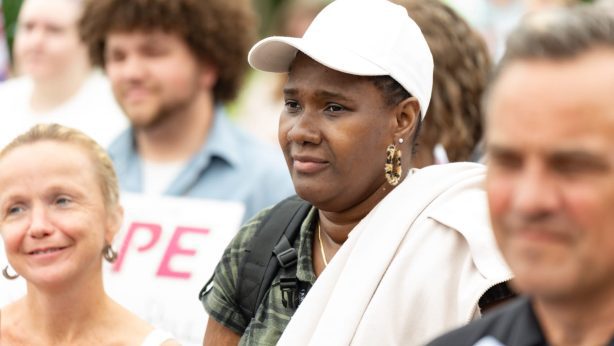Nell Toussaint clears legal hurdle for health care for migrants without status in Canada
Nell Toussaint’s story epitomizes the slogan, “health care delayed is health care denied.” On August 17, the 51-year-old woman from Grenada who has been in Canada for 23 years cleared an important legal hurdle for health care for herself and all undocumented people in Canada.
The Ontario Superior Court of Justice denied an attempt by the Canadian government to dismiss Toussaint’s claim that seeks $1.2 million from the federal government and demands that irregular migrants be granted access to essential health care. The court found there are reasons that indicate Toussaint’s claims have merits. Canada’s Attorney General has 40 days to file a statement of defence. Otherwise, the claim will proceed in court and may be heard as early as next year.
“To fight for others and win.”
NELL TOUSSAINT IN THE TORONTO STAR, AUGUST 18, 2022
Ten human rights organizations, including the Canadian Health Coalition, Amnesty International Canada and the FCJ Refugee Centre, acted as intervenors in Nell Toussaint v. Attorney General of Canada. Notably, Toussaint has the support of the United Nations. The UN condemned Canada for discriminating against Toussaint based on her immigration status. The UN also said Canada failed to meet its international obligations to Toussaint’s “right to life.” More than 1,500 doctors and other health care professionals have also supported Toussaint’s struggle.
Toussaint came to Canada from Grenada in 1999. After her visitor visa expired, she stayed in the country as an irregular migrant. She repeatedly tried but failed to regularize her status.
When she fell ill and needed health care, she became a champion for health care for the undocumented in Canada.
In 2009, Toussaint requested but was denied access to Canada’s Interim Federal Health Program. The program gives limited health care benefits to asylum seekers, resettled refugees and detained migrants. The Immigration Minister, with discretionary powers over such applications, refused to support Toussaint’s application. Toussaint then challenged the ministerial decision, but failed to win the support of the Federal Court and the Federal Court of Appeal.
In 2013, Toussaint became a permanent resident with access to health care, but by then she had suffered “irreversible sicknesses.” She has diabetes and has gone blind and has had one of her legs amputated above the knee. Her kidneys have failed. She also suffered a stroke and an anoxic brain injury caused by heart failure.
Human rights advocate Bruce Porter and lawyer Andrew Dekany then brought Toussaint’s case to the UN Human Rights Committee. The lawyers argued that Canada was violating the International Covenant on Civil and Political Rights in Toussaint’s case. On August 7, 2018, siding with Porter’s legal team, the UN Human Rights Committee ruled Canada must take necessary actions to ensure no one is denied access to essential health care because of irregular immigration status. According to Porter and the legal team, this is the first time a UN treaty monitoring body has considered access to health care for irregular migrants a right to life issue.
In 2020, Toussaint, armed with the UN decision, brought her claim against the federal government to the Ontario court. During a hearing last June, Canadian government lawyers tried to argue that Toussaint’s case was an abuse of the process because federal courts had already adjudicated the case. Justice Paul Perell, presiding over the case, disagreed and also found the government lawyers’ arguments to be offensive. He noted that the arguments perpetuated negative stereotypes of irregular migrants.
Justice Perell said: “In a dog whistle argument that reeks of the prejudicial stereotype that immigrants come to Canada to milk the welfare system, Canada mischaracterizes Ms. Toussaint’s Charter claim as a right to receive free health care anywhere in the world regardless of one’s lack of status.
“Since Ms. Toussaint’s claim does not assert a right to free health care anywhere in the world regardless of one’s lack of status, Canada’s argument is a fallacious straw man argument that might successfully knock down claims that are not being asserted.”
Martha Jackman, a University of Ottawa law professor, who represented the Canadian Health Coalition as an intervenor in Toussaint’s case, told the Toronto Star on August 18 that the court decision is important with the federal and provincial governments putting into place measures to give access to public health services to all people regardless of immigration status during the COVID-19 pandemic.
“The COVID pandemic really illustrated that keeping everyone healthy is in the best interests of everyone in Canada. Canadian governments recognized in the pandemic that we all live together,” said Jackman while pointing out that the pandemic showed that Canada can afford public health care for all.
“The sky did not fall and public finances were not crippled. In a way, the evidence suggests that this is actually … economically rational, as well as a human-rights-compliant policy,” said Jackman.
Despite the moves to make health care more accessible to migrants during COVID-19 such as Ontario’s move to give public health insurance to everyone not previously covered, including migrants, the pandemic has not ended discrimination in Canada’s public health care system.
A 2020 study on the working and housing conditions of migrant workers in Prince Edward Island during the COVID-19 pandemic found that migrant workers in the island’s fish plants and farms were not given the information they needed to access health care. Those with Medicare cards were sometimes surprised that it did not cover prescription medications and certain medical treatments. Some of the temporary foreign workers interviewed for the study also said they were not paid for taking time off work when they fell ill.
Migrant rights groups across the country note that health care remains out of reach for many migrants in Canada, including temporary foreign workers, the undocumented and international students. However, migrant advocates say there is hope with Prime Minister Trudeau instructing Minister of Immigration Sean Fraser to give Permanent Resident status to the undocumented.
The Migrant Rights Network is asking people to send a letter to their Member of Parliament asking that no one be left behind in the regularization program. According to the Migrant Rights network, the lives of 1.7 million people in Canada would benefit from being granted permanent residency. No longer would temporary foreign workers have to wait months for a Medicare card or would the undocumented have their sicknesses go untreated because they can’t pay.
The Canadian Health Coalition believes that health care in Canada is a fundamental right without distinction of race, gender, age, religion, sexual orientation, political belief, immigration status, and economic or social condition.
Toussaint’s motto as told to The Star provides inspiration to all those fighting for universal health care: “To fight for others and win.”
Photo: Nell Toussaint and lawyer Bruce Porter. Photo from the Global Initiative for Economic, Social and Cultural Rights.
Tracy Glynn is the National Director of Projects and Operations for the Canadian Health Coalition


